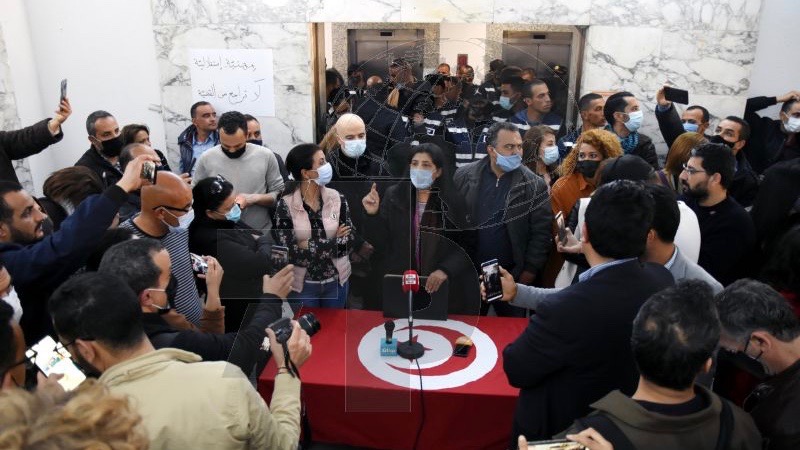Trade unions and journalists’ organizations in Tunisia have condemned the violent attack by security forces against protesting journalists at the headquarters of the state-owned Tunis Afrique Presse (TAP) news agency, Middle East Monitor reported. The Tunisian police reportedly raided the TAP premises on Tuesday, April 13 to force the entry of the newly appointed head of the state news agency, Kamal Ben Younes, into his office. Ben Younes’ appointment by prime minister Hichem Mechichi on April 6 has drawn widespread protests and opposition from the journalist community in the country.
Denouncing the police attack, the Tunisian General Labour Union (UGTT) along with a number of other political parties and civil society groups, warned the government against attempts to “tame the media,” calling them reminiscent of the policies and actions under the authoritarian rule of former president Zine El Abidine Ben Ali. The National Syndicate for Tunisian Journalists (SNJT) also issued a statement expressing “strong condemnation of the police raid on the Tunis Afrique Presse agency and considers that the security interference in the media is a dangerous and absolutely unacceptable violation.”
The journalists’ union, in coordination with labor unions, has called for a general strike on April 22 to protest the appointment.
The protests staged by journalists on Tuesday, many of them TAP employees, as Ben Younes attempted to enter the headquarters with police assistance saw clashes and arguments with the police. Protesters were seen chanting slogans like “TAP is free” and “police must go.”
Ben Younes has been accused of political bias due to his alleged close links with the powerful Islamist Enhada party. His appointment as CEO of TAP is viewed as a purely politically motivated move by the prime minister, who is dependent on the support of Enhada to keep his government afloat. Several journalists fear that Ben Younes will compromise the editorial independence at TAP. They also point to his past actions and controversial positions before the 2011 revolution, when he spoke against the freedom of press and expression and against union actions in the country. He had also supported moves to place restrictions on these democratic freedoms.
Ben Younes, who already serves as the head of the religious Zitouna TV radio network, was well-known for supporting Ben Ali and was considered an important figure in his regime before and during the revolution. Several TAP journalists criticize him for actively promoting the pre-revolution dictatorial regime’s propaganda, especially his efforts to undermine the independence of the Tunisian League of Human Rights (LTDH). He has also made several offensive and regressive remarks against women. While Ben Younes has denied all these accusations against him, PM Mechichi has called his appointment a strictly administrative move.
The SNJT in its statement warned the government that “the policy of open confrontation with the media institutions will increase hostility, social tension and lack of trust.” The statement holds the government responsible for the consequences of making political appointments in running media establishments. It has urged the government to initiate a comprehensive dialogue to reform these institutions, “instead of seeking to tame the voice of the media in order to serve certain political and partisan agendas.”
Despite Mechichi’s assurances, the protesting journalists have not scaled down their opposition and continue organizing sit-ins and protests. The journalists’ syndicate and Tunisian labor unions have together announced plans to hold a general strike on April 22 – the first ever of its kind since TAP was founded in 1961. While TAP was known in the country as a propaganda mouthpiece during the Ben Ali regime, the agency changed tracks completely after the revolution. It gained substantial editorial independence, often publishing stories and articles criticizing and questioning the governments in Tunisia in the last 10 years.





